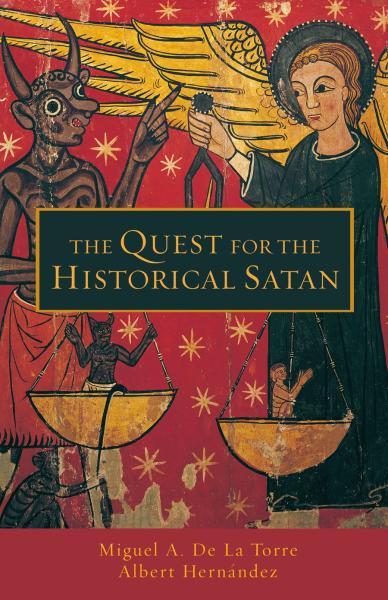By Emily Manuel
Religion Dispatches

The history of Christianity, as atheists are fond of reminding us, is one that has been drenched in blood. Whether religious war, inquisition, or colonial violence, there’s been great evil committed in the name of God. What role has the idea of Satan played in the development of this culture? Theologian Miguel De La Torre, with co-author Albert Hernàndez, has just published a book, The Quest For the Historical Satan, that takes this question by the tail.
I spoke recently with De La Torre about the disastrous legacy the idea of Satan has bequeathed to Christianity, the dark side of God, and about the persistence of that Obama-as-Antichrist campaign.
What’s the general idea behind this new book?
God’s portrayal as a character of absolute goodness is the result of a theology that is read into the Christian Scriptures, yet which is not necessarily supported by a close reading of the texts.
Not only is this theology challenged by the Bible, it is also challenged by existentially and morally comparing such a theology of absolute Good versus absolute Evil with the realities of life. All have faced, or will face, tragedy, misery, illness, and death—events will occur that appear unfair, leading most of us to question if any sense of cosmic justice and mercy truly exists.
When we consider the billions of senseless deaths, tragedies, and atrocities which define human history, it would seem that history denies more than it confirms the paternal love of a caring and merciful father God. One is forced to ask, Where is God?
In a very real way, the search for the historical Satan is an attempt to justify God’s grace while legitimizing the reality and presence of evil in human history. It appears that the development of Satan was, to a certain extent, trying to save God from appearing as the source of evil that is so much a part of the reality of human suffering and death.
One of the fascinating things about the book is the way you trace the changes in conception across language, as with the Greek word daimonion which simply meant “god” or “spirit.” Did you think that shifts across languages reflect some of the later themes in terms of demonization of Otherness?
That was one of the things that we immediately discovered, that making the Other the demon or the representation of evil allowed those defending truth and honesty and righteousness to commit all types of horrors upon that they had defined as monstrous. That led us to thinking about how can we rethink Satan in such a way that will not lead us to demonize others.
You conclude with the idea of Satan as a trickster figure. Is that idea something you imagine contemporary Christians will be drawn to?
Quite frankly, the image of the trickster was always there, specifically in the Hebrew Bible; it’s a tradition of re-interpretation that makes Satan into the figure of absolute evil. My co-author and I look to the Hebrew Bible with an understanding of the ambiguity of goodness and evil. How will Christians today accept that? I don’t think that people are going to be waking immediately to this understanding, because we’ve had over two thousand years of conditioning. But I’m hoping it will at least begin a conversation.
You suggest that the personified Satan emerges as a solution to the central question of what theologians call “theodicy”—how can God be good when evil exists?
The book definitely wrestles with the whole theodicy question: how can an all-loving all-powerful God allow such evil to occur? But when we looked at the Hebrew Scripture, we really noticed that there’s a dark side to God. Even in Judaism today, there is this recognition that God does have a dark side.
What the creation of Satan has done is really save God from how the scripture understood God. Amos reminds us, “If there is evil in a city, has Yahweh not done it?” (Am. 3:6). The prophet Isaiah understands God to say, “I form light and create darkness, make peace and create evil, I Yahweh do all these things” (45:7). This is a God who sends evil spirits to torment, as in the case of Saul (1 S. 18:10) or Jeroboam (1 K. 14:10). We take those texts very seriously in trying to ascertain the very character of God.
To Read the Rest of the Interview
No comments:
Post a Comment